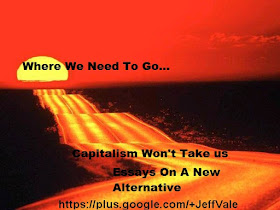You cannot have Socialism inside of Capitalism and expect it to work correctly. And that is even assuming that Capitalism hasn't become a toxic, corrupted, and mutated monster. Which it of course has become.
The world is simply too insanely competitive, short on resources, and far too close to an extinction event, to stay with Capitalism in any case, whether you want Socialism or not. Which also means that we will need the cooperation of a lot of conservative folks to make sure we can do all of the tremendous tasks that lie ahead, if life on the planet is to survive at all.
That is why a "Grand Compromise" between Right and Left is absolutely essential. And we are most certainly not going to get much of any compromising at all if we don't come up with some creative new thinking on how we go about taking care of what boils down to certain, prime priorities, that both sides have.
I have proposed one such alternative. I was hoping it might encourage others to think of even better alternatives, or at least offer suggestions as to how to make mine better. The point, however, being that we absolutely do need a new alternative; whatever we can ultimately negotiate one to be that can also provide for the three main areas of concern: First certainly being all of the practical things you might think of for a society (people getting not only the things they need, but also a good portion of what they want); but secondly, to also inequality of outcomes, make our communities much more self sufficient, and fault tolerant (because resources will become more scarce, and the geo physical environment more turbulent), fix the environment, and start the infrastructure building required to do another "Great Migration" (because you can't fix an environment that keeps generating too many people). And then, on top of all of that, still have something left over to make it all feel right in the greater sense of things.
As such you can certainly sum it all up as one very hard process to have to get through. But get through it we must or we will surely perish. The trend line for the ice at the poles, and what that will do to circulation systems, and already stressed ecosystems, make that clear. Basically big changes in the weather could happen, be they extremes of hot, or cold (just like the movie "The Day After Tomorrow"). And those changes probably won't be very suitable for much of what stands for life now. Not as far as we are concerned anyway.
In my view, what we face cannot be solved by a few new legislators, or re-hashed Liberalism that might have a dose or two of Progressive flavor to it. As
William Greider made clear, Big Money is very good at playing a waiting game. A law now, even if you can't water it down much at the start, can be co opted, and/or corrupted, in a number of other ways, when you look at it from the perspective of legislative re election cycles, and the way Big Money can make things hard on an economy when the social reformers are in office. What we face hinges on control of even the commoditization of information itself, and how that control threatens forming negotiated, social realities (where we come to terms on what we all think are the most important priorities), in the first place.
You either face this reality or you play games with who is in sudo control of this titanic disaster of ship we call "The United States of America." And games about what who lives on what deck, and who has to be sweating it out in the deep places, getting darker all the time, trying to stay alive, stay afloat, and keep the terrible thing running. Knowing in our hearts, if not our heads, that it is on a course to make good effect of centuries of ever more bad choices, and the impact they can have on cold, hard, rude awakenings.
They want single-payer health care, a higher minimum wage, and greater protections for unions. But others advocate more extreme changes, such as abolishing the prison system.

































